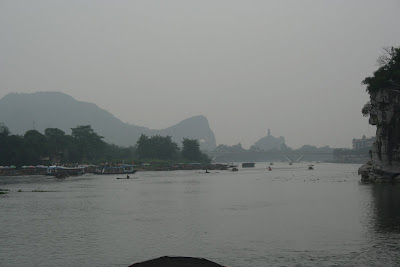
This area was one that Missy and I were looking forward to most on our trip through China. We'd seen plenty of pictures of this picturesque river basin, but we knew it would be more spectacular in person. We ended up staying five days here, and it didn't let us down.

We first arrived in Guilin by air from Xian. We got in at night and had an interesting time finding our hostel. We ran into two travelers from Spain who spoke great English but no Chinese. Turned out they were staying at the same hostel, and thus, I became responsible for trying to use my broken Chinese to figure out first which bus stop to take (Guilin is much bigger than I was expecting) and then how to get a cab to our hostel. I had some help from a friendly Chinese businessman on the bus, whose English was just slightly better than my Chinese. We managed to get to our hostel (despite it being marked on the wrong place on the map in my guidebook...tsk tsk Rough Guides...), and we ended up wandering down one of the main streets and strolling through a nightmarket. Oh yea, and the hostel was well worth it! It was a bit like a hotel, but Missy and I were not complaining; our room even had a balcony that overlooked one of the rivers (Guilin has several)! The picture above is of Elephant Trunk Hill. If you haven't already figured out, the Li River area is blessed with these jagged, karst mountains. The birds and the raft in the foreground are popular in the region, where the river defines daily life. The birds, cormorants, were used historically as fishing birds; cormorant fishermen would tie loose ropes around the birds necks so that when they dove to catch fish, they would be unable to swallow them. The fishermen would treat the birds to every seventh fish they caught. While some people still fish by this method, it has become more of a show for tourists.

Once again, the river defines life in the area. Mostly everyone lives off of it in someway and most definitely gets the majority of their diet from it (or the livestock and fields that it nourishes).

We didn't stay in Guilin long (only overnight); it is a very, very big tourist city, which we wanted to avoid. Many more adventurous travelers head downstream to the bustling tourist town of Yangshuo, which is smaller than Guilin and closer to the heart of the densest mountain scenery and is the town where most of the large river cruises end at. We decided that this town was still too big for us and moved on from here, but not after wandering around a bit first.

I'm lovin' it...the mountains that is. Plus, here in Yangshuo, we were treated to our first truly blue skies of the trip!

The town sits in a valley that is surrounded on three sides by the mountains and the other by the river. It is a beautiful little place and has a lot of neat shops and market stalls, though some of them are quite spoiled by rich tourists who don't know how to bargain.

At the docks, looking upstream towards the heart of the karst mountains. It was up that way, in a small village, that Missy and I decided to lose ourselves in for a few days.

It's amazing seeing the river being shared by fisherman on those tiny bamboo rafts right alongside the massive sightseeing boats, which can hold a few hundred people!

This cormorant fisherman didn't do too much fishing with his birds, more posing with tourists for a few yuan. He was very friendly though, and really, the pictures are worth it!

I would highly recommend checking out Yangshuo on a market day. There is a vegetable market (with fruit, fish, and other river goodies included) as well as a meat market. The vegetable market is well lit and very colorful, as you will see in the next few pictures, while the meat market is dark and dank. Missy made it about two steps into the meat market before turning around, much to my disappointment. There was pretty much every part of a variety of animals available for sale, with much of the butchering being done on the spot. I was quite intrigued! However, we did spend some time wandering the vegie market. The picture above shows some of the edible delights from the river, namely, snails, toads, eels, crayfish, freshwater shrimp, and the odd fish or two. I had the snails and shrimp while there, and I must say, the snails were superb in a spice pepper sauce.



No comments:
Post a Comment